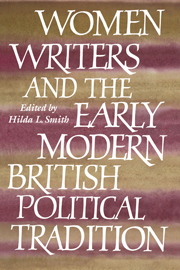Book contents
- Frontmatter
- Contents
- List of contributors
- Preface
- Introduction: Women, intellect, and politics: their intersection in seventeenth-century England
- Part I Women's political writings, 1400–1690
- Part II Women's political and philosophical writings, 1690–1800
- Part III The intellectual context and economic setting for early modern women
- Introduction to Part III
- 9 Contract and coercion: power and gender in Leviathan
- 10 The significant sounds of silence: the absence of women from the political thought of Sir Robert Filmer and John Locke (or, “Why can't a woman be more like a man?”)
- 11 Catharine Macaulay: patriot historian
- 12 Investments, votes, and “bribes”: women as shareholders in the chartered national companies
- Part IV Early modern legal and political prescriptions for women
- Conclusion: women's writing, women's standing: theory and politics in the early modern period
- Index
9 - Contract and coercion: power and gender in Leviathan
from Part III - The intellectual context and economic setting for early modern women
Published online by Cambridge University Press: 04 August 2010
- Frontmatter
- Contents
- List of contributors
- Preface
- Introduction: Women, intellect, and politics: their intersection in seventeenth-century England
- Part I Women's political writings, 1400–1690
- Part II Women's political and philosophical writings, 1690–1800
- Part III The intellectual context and economic setting for early modern women
- Introduction to Part III
- 9 Contract and coercion: power and gender in Leviathan
- 10 The significant sounds of silence: the absence of women from the political thought of Sir Robert Filmer and John Locke (or, “Why can't a woman be more like a man?”)
- 11 Catharine Macaulay: patriot historian
- 12 Investments, votes, and “bribes”: women as shareholders in the chartered national companies
- Part IV Early modern legal and political prescriptions for women
- Conclusion: women's writing, women's standing: theory and politics in the early modern period
- Index
Summary
Sexual difference is political difference; sexual difference is the difference between freedom and subjection.
Carole PatemanAlthough the ideology of liberalism has always proclaimed the values of freedom and equality, liberal societies have always been underpinned by a sexual contract in which these ideals have been systematically violated.
Quentin SkinnerContemporary feminism has attacked the male biases of liberalism, labeling as convenient fictions notions that “citizen” is a gender-neutral concept, or that distributive justice is possible when “universal” laws fail to take the female body into account. When combined with a long tradition of anti-capitalist thought, these critiques add up to an indictment of Enlightenment liberalism, which is then portrayed as a barrier to solving contemporary problems rather than as a basis on which to build.
Among feminist critiques, Carole Pateman's The Sexual Contract is powerfully argued and provocative, and has become a classic of feminist theory. Pateman attacks liberalism at its origin in the theories of social contract, beginning with Hobbes's Leviathan but relying heavily as well on the theories of Locke and Rousseau. My argument is not with her views of Locke and Rousseau, but stems from my concern that her critique of Hobbes, which is central to her case that the subjection of women is foundational in liberal contract theory, is wrong about Hobbes and has the effect of alienating feminist theory from contract theory, with potentially harmful consequences for feminist political practice.
- Type
- Chapter
- Information
- Women Writers and the Early Modern British Political Tradition , pp. 200 - 219Publisher: Cambridge University PressPrint publication year: 1998
- 1
- Cited by

